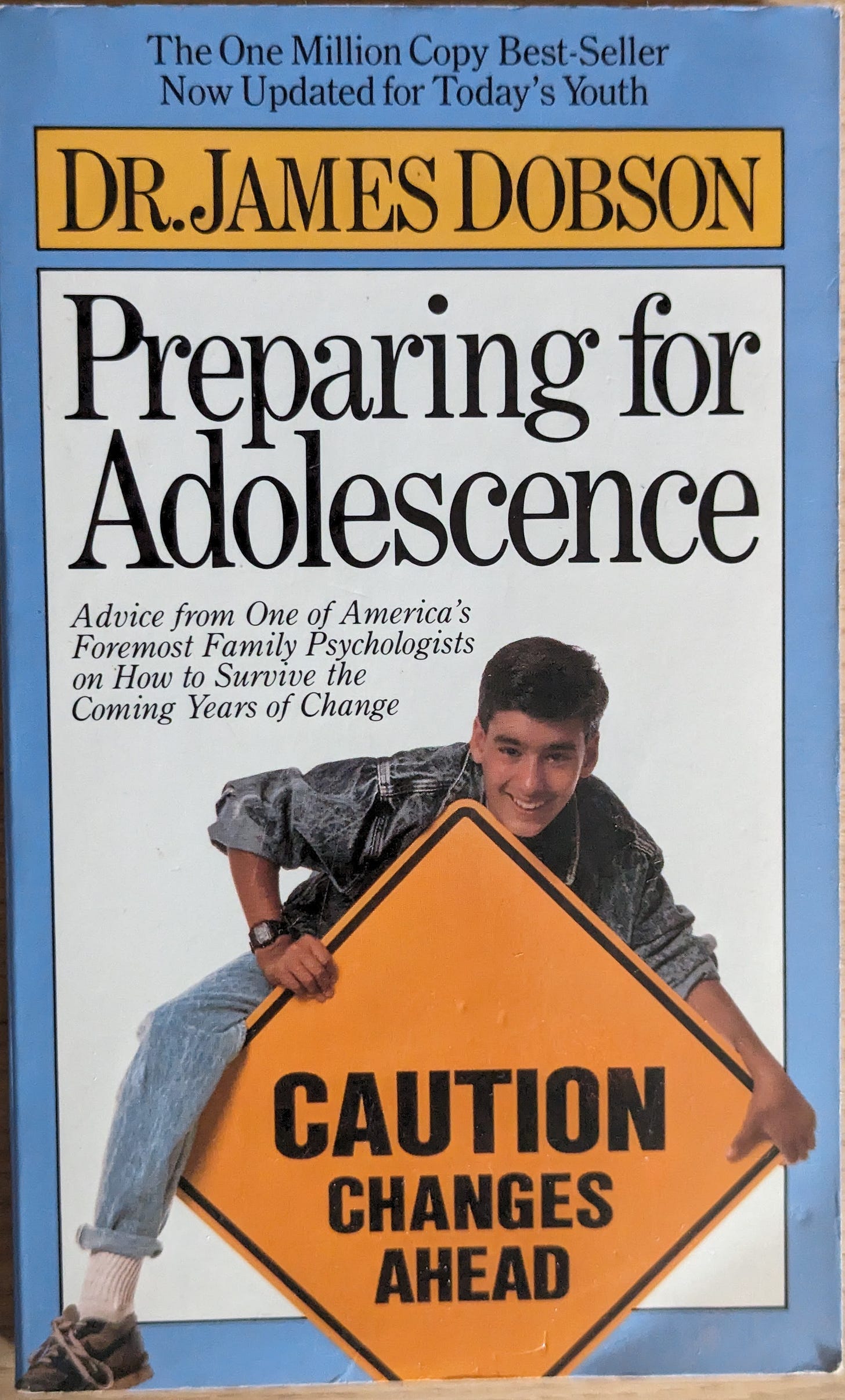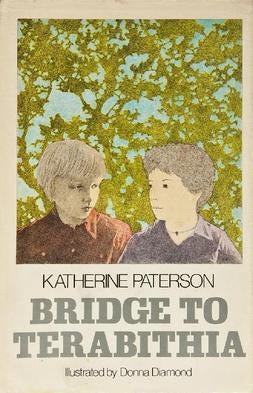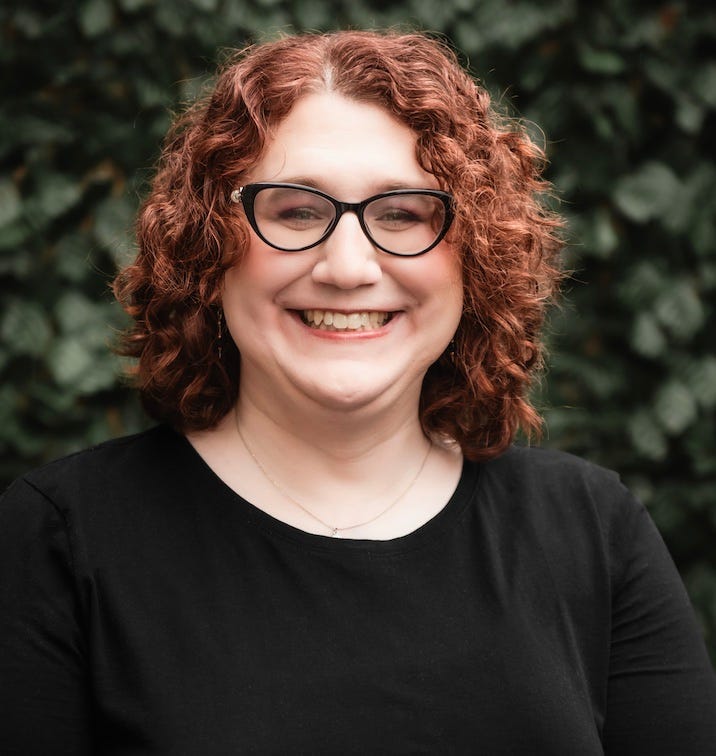Strongwilled is a multi-media project aimed at helping survivors of religious authoritarian parenting methods reclaim their autonomy and find community. Today we are pleased to share a guest post by the incredible journalist Chrissy Stroop, who shares a bit of her own story of coming out later in life. Please subscribe to Chrissy’s newsletter The Bugbear Dispatch and check out the links to her writing throughout the piece and also at the end.
This newsletter is survivor centric and survivor supported. Thanks to the generosity of our founding members, we are able to offer free paid subscriptions to people who are LGBTQIA+ who are not able to afford them. Please e-mail us at strongwilledproject @ gmail if you would like a paid subscription.
The Story of a Late Bloomer : A Guest Post by Chrissy Stroop
To grow up evangelical in America is not only to be subjected to intensely heteronormative socialization. It is also to be denied—to varying degrees depending on the level of strictness and isolation of one’s family—information about any other gender and sexuality possibilities. Add to that the social disciplinary mechanisms that enforce conformity across the board, the often deeply internalized fear of hell, and the very specific forms of sexual shaming that constitute evangelical purity culture, and you have a recipe for some serious repression and future relationship problems.
I don’t have the stereotypical transfeminine narrative of insisting I was a girl from an early age. Thankfully, our society and the legitimate medical establishment (as opposed to the phony ideology-driven junk and very Christian “science” establishment used to set policy in states like Florida) are starting to move past the demand for that sort of story in order to validate transfeminine experiences and grant transfem folks access to gender-affirming healthcare.
I didn’t realize I was queer at all until I was 33 years old. Given that I was born in 1980, when the American mainstream had hardly any exposure to notions of transness apart from stereotyped and often unsympathetically portrayed “transvestites,” I’m not entirely sure how much of my delayed queer awakening has to do specifically with evangelical repression vs. American society in general, but I am certain that the evangelical component is profoundly important—and profoundly damaging.
My not so neat and tidy narrative begins with simply feeling “off,” “different,” and uncomfortable in my own skin as a child, which meant that I often felt as much or more like an observer of the events I lived through than a participant. To be sure, I loved my family, and I received a lot of encouragement and access to opportunities not every kid had. But I was bookish, intensely cerebral, and spent a lot of time alone reading—to the point that my mom would sometimes tell me to “take your nose out of your book and be sociable.”
I identified with strong female characters in the books I read—Mom’s old novels in many cases, so we’re talking about characters like Ramona Quimby and Nancy Drew. And most importantly of all, Leslie Burke from Bridge to Terabithia—a novel I somehow got a new copy of sometime around 1990 or so, and that, in retrospect, it’s sort of funny I was allowed to read. My mom, an elementary teacher in our K-12 Christian school, had preapproved all Newberry Award winning children’s novels, probably not thinking about one of those novels painting a deeply moving and sympathetic portrait of a child atheist.
Leslie challenged gender stereotypes, and there was something about her androgyny (and her ability to beat her male classmates in races) that appealed to me even then—but I was also wowed by her outspoken atheism, active imagination, and bluntness. Just as she opened up new possibilities to the other protagonist Jesse Aarons, who came from a fundamentalist Protestant family much more like mine than Leslie’s Bohemian family, Leslie also opened up new horizons for me. That book was one of my windows into a world outside evangelicalism that generated a lot of cognitive dissonance for me in the years ahead.
When my parents decided it was time for me to learn about sex, around the summer of 1991 if memory serves, I got a confusing little talk from my very embarrassed father and a copy of authoritarian Christian parenting guru James Dobson’s Preparing for Adolescence. To be honest, I don’t remember a lot about the book, but one thing that stuck with me is that he (oddly enough) didn’t want kids to be overly saddled with guilt for masturbation, so he posited that it might kind of sort of be okay sometimes so long as no fantasizing was involved. Since demanding a total lack of fantasizing sets an essentially impossible bar, I don’t suppose this little indulgence really helped so much with the guilt over masturbation that I would indeed come to feel throughout my preteen and teenage years.
The evangelical purity culture I was bombarded with got even weirder after my family moved to Colorado Springs in 1993, where my dad took a music pastor job at a “hip” church that was, you know “seeker sensitive” because the “messages” (not sermons, you see) were “relevant,” the worship choruses were “modern” (unlike those boring old hymns), and we called the bulletin a “program.” All the same shitty theology, but this is “not your grandma’s church,” man.
Because my mom, sister, and I moved in the middle of the school year (Dad had to move a bit earlier), I spent the second semester of sixth grade in public school, where I actually got some decent, age-appropriate, secular sex education (not to mention learning about evolution in science class). I wanted to stay in public school after that year, but my parents wouldn’t let me. And besides, my mom’s new employer, Colorado Springs Christian School, required its employees to send their children there. As I later learned, that is the standard authoritarian practice of Christian schools, who used to give employees free tuition, though now it’s typically just a discount that increases with seniority, but now there are also vouchers almost everywhere, so… The only way for a child to escape this is to get expelled, which is something my goody two-shoes self would never be able to do.
My “sex education” at CSCS, such as it was, involved repeated exhortations not to do anything with a boyfriend or girlfriend that you wouldn’t do with someone else’s husband or wife, because if you don’t end up marrying that boyfriend or girlfriend then you are cheating on both your future spouse and their future spouse. Who, if you’re keeping track, are very much not married yet, and probably haven’t even met, but since marriage is supposed to be all mystical and eternal, I guess you wouldn’t want to “cheat on them” in advance. Talk about a mindfuck, eh? And then there was the “retreat day” that my entire seventh-grade class was taken to a space off campus where we were given the misinformation that condoms fail basically all the time and can’t prevent AIDS along with a lot of other fear-mongering about diseases and pregnancy and a hefty dose of shame. The culmination of that day involved us all being “invited to prayerfully consider” singing purity pledges, that is, making a vow to God that we would remain virgins until we married.
At the time, I would not have argued against the idea that God defined marriage as a union between one man and one woman and that it was a sin to have sex outside of that kind of marriage. But even so, I felt manipulated and coerced, and that rubbed me the wrong way. Of course I signed the pledge—how was I to know if I’d be punished for not signing it? I suspect that everyone signed it, many probably for the same reason I did. But I didn’t like it, and not because I intended to have sex before marriage. I was just beginning to be bothered by the clearly manipulative evangelical approach to cementing and enforcing our beliefs that were supposed to be true and sincerely held. If we really believed it all, why did we need to be so manipulative?
In short, the cognitive dissonance grew. And I remained a weird kid. By the time I was able to drive, in high school—we were back in Indiana then, after a falling out with the pastor of our Colorado church plant—people in my social milieu would give me a hard time for going out with so many girls just as friends. That’s another aspect of evangelical purity culture, embodied in the “Billy Graham rule” that you might have heard of. Was I leading these girls on? Were they leading me on? How could I go out with multiple girls? The truth is, because we were friends, and as someone who lives in her head I’ve always felt most at ease when socializing one-on-one or in small groups.
But evangelicals have to make every “opposite-sex” interaction weird, and I was of course understood to be a boy and understood myself that way—though I didn’t really identify with masculinity and was sometimes teased for failing to live up to expectations of maleness. For example, one popular high school boy would smirkingly ask me about listening to Alanis Morissette, and I genuinely did not get why there was something wrong with a young man rocking out to the tunes of an angry woman rocker who famously sang about how shitty men are.
When I was called out on not being very masculine, I could always fall back on the fact that I was attracted to girls, and so, I figured, I couldn’t be anything other than straight. In fact, when I responded to teasing with “I’m comfortable in my masculinity,” all that sentence ever really meant was “I like girls,” or, if you prefer, “I’m not gay.” When I finally did get into relationships with straight girls, my inability to properly play expected masculine roles got me into trouble. But I still had no real understanding of queerness apart from the idea of homosexuality, and from the time I was about 16 on, I was so preoccupied with a protracted and painful crisis of faith that it left little bandwidth for thinking about gender and sexuality. And all I knew of gender diversity remained “the transvestite,” who was always portrayed as ultra-feminine and only attracted to men and was maybe a serial killer, and so, therefore, was not me.
To make a long story short, I had to more or less completed the deconstruction of my evangelical faith—something that took me a very long time, and for which I did not have any of the resources available today (like the blog where you’re reading this)—before I could begin to come to terms with who I was on many levels, including in terms of gender and sexuality. A queer woman I briefly dated in my early thirties helped me to figure myself out, and I suppose it all started when she initially teased me about having so many lesbian friends. (What, that’s not normal?)
I began to learn more about the gender spectrum, and how gender and sexuality operate independently from each other (i.e., bi and pan and lesbian trans women exist). The pieces started to fall into place. And two funny things happened. As soon as I recognized myself as a transgender woman, all the lingering fear of hell that still haunted me, even though I’d stopped believing in hell about a decade prior, simply dissipated. The crisis of faith I’d been so torn up with for so long, in other words, was never a purely intellectual matter. It was at least in part a proxy battle for the recognition and validation of the parts of myself that evangelicalism had forced me to suppress. The other funny thing is that it wasn’t too long after this epiphany that I crushed on a man for the first time, and I realized that, while I may lean strongly toward attraction to women, I’m not exclusively attracted to women. Huh.
I suppose every late recognized, late-blooming exvangelical queer person’s story is different, but I hope that in sharing these aspects of mine, some readers may find something relatable. If you’re questioning your gender, you should know that figuring it out isn’t a race, and that taking the time to allow yourself to get to know yourself after a childhood and youth of hardline religious indoctrination is a necessary step on the path to healing. Evangelicalism effaced so much of me that for a long time I didn’t really know who I was or what I wanted. I’m still figuring some of that out. Queer authenticity isn’t easy, particularly in this era of angry right-wing Christian backlash and attacks on LGBTQ rights. But for what it’s worth, I would never go back. Because we live in a pretty fucked up society, authenticity comes with a cost—but it’s simultaneously life-giving, whereas conformity crushes the soul.
Happy belated Pride, my fellow exvangelical (and similar) queers and gender nonconformists! Wherever you are on the road to self-discovery and self-expression, you are valid.
For further reading on evangelical authoritarianism, gender, and sexuality, here are links to a few things I’ve written over the years:
Anti-Gay Evangelicalism is the Norm: A Les Rosy Take on the Evangelical “Tipping Point” (2015)
The Struggle for LGBTQ Inclusion at Christian Colleges and Universities (2019)
Is Being Trans a Religion? Why the Christian Right Wants You to Think So (2021)
Texas Parents of Trans Kids Speak Out on Shocking “Child Abuse” Policy (2022)
The coeditor of the essay anthology Empty the Pews: Stories of Leaving the Church, Chrissy Stroop has been a visible contributor to exvangelical discussions since the early days of their proliferation on social media. Previously a weekly columnist for openDemocracy, Stroop is a senior correspondent for Religion Dispatches and has bylines in The Boston Globe, Foreign Policy, Playboy, and other outlets. Stroop grew up in Indiana and Colorado Springs, spent a lot of time in a lot of different places in her 20s and 30s (including 8 years at Stanford, where she earned a PhD in modern Russian history), and now happily resides near Portland, Oregon with chosen family and a mischievous Pomeranian. Check out her newsletter, The Bugbear Dispatch, at www.bugbeardispatch.com.
Thank you Chrissy for sharing your story! Happy pride everyone :)











Thank you for sharing a bit of your path. I think that was a great way to sum it up with, “authenticity comes with a cost—but it’s simultaneously life-giving.” I’m finding that to be true, too.
Chrissy, I hope that this is isn’t a weird comment: as I was reading this essay I - a person who read your stuff far enough back to remember when you wrote under your dead name- spent several seconds wondering why in the world your conservative father would have the sex talk with his daughter instead of tasking your mom with the conversation. 🤦♀️ Of course, your parents didn’t yet know that they were talking to their daughter about sex.
Thanks for sharing your experiences. I’m so very happy that you were able to find yourself!